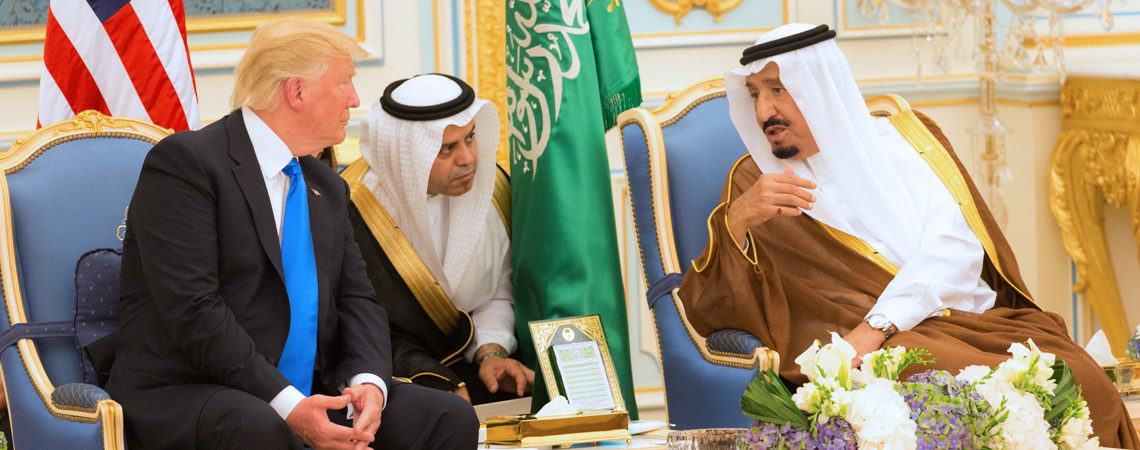Two U.S. Lobbying Firms Push Discredited Information on Yemen Conflict
As Congress prepares for a vote today on a proposed sale of U.S. precision-guided munitions to Saudi Arabia for use in Yemen, there are growing concerns about Saudi-funded U.S. lobbying firms pushing faulty information about the Yemen conflict. According to documents available through the Justice Department, at least two U.S. lobbying firms distributed a report in the past year that includes several facts on Saudi’s role in Yemen that have been refuted by human rights and humanitarian NGOs. The aim appears to be to downplay Saudi airstrikes on civilians and absolve some responsibility for the worsening humanitarian crisis.
The two U.S. lobbying firms that distributed the report are Qorvis MSLGroup and Brownstein Hyatt Farber Schreck LLP. In the past, Qorvis has represented other governments such as Equatorial Guinea, which has a poor human rights record. Brownstein Hyatt Farber Schreck only recently began its work with the Kingdom, but staff named in the firm’s contract with Saudi Arabia have previous government experience and include heavy hitters like Marc Lampkin, who worked as an aide to former Speaker of the House John Boehner and has connections within the Trump administration.
Between December 2014 and March 2017 Qorvis received over $16 million in fees from Saudi Arabia. Brownstein Hyatt Farber Schreck LLP signed a four-month contract with the Saudi Ministry of Foreign Affairs in September 2016 to represent Saudi interests “in connection with certain priority legislative issues of importance to the US-Saudi bilateral relationship.” The firm was to be paid $100,000 per month for its services.

The picture painted in the 57-page lobbyist report portrays Saudi Arabia as the victim of a regional conflict and a responsible neighbor coming to the aid of the Yemeni government. The report claims that the Houthi rebels and not the Saudis are the ones blocking the delivery of aid to civilians through the port city of Hodeidah. It claims that “The [Saudi-led] Coalition has not imposed a blockade… and it continues to grant immediate and periodic permits in a record time for all relief and humanitarian ships”.
These assertions are refuted by Save the Children, which argues that the Saudi Coalition prevented three shipments of medical aid from being delivered to Hodeidah. Grant Pritchard, Save the Children’s Yemen director, says the Saudis “are turning aid and commercial supplies into weapons of war”. The Washington Post and the United Nations also offer accounts of the blockade on Hodeidah that contradict the report distributed by Saudi lobbyists.
The lobbyists’ report spends four pages discussing Saudi Coalition airstrikes that have indiscriminately targeted civilians, creating the impression that the Coalition has appropriately handled these incidents and reformed its practices. It uses investigations completed by Saudi Arabia’s own investigative body, the Joint Incidents Assessment Team (JIAT), to absolve itself of any systematic targeting of civilians and discredit other organizations’ investigations. However, all seven JIAT investigations in the lobbyists’ report include some information that is disputed by at least one NGO, creating questions regarding the veracity of the report and JIAT’s methodology.
One of the examples provided by the report offers JIAT’s assessment of an air strike on Abs Hospital, where Medecins Sans Frontieres was operating on August 15, 2016. JIAT stated that the Saudi Coalition was unaware of the presence of the hospital, claiming that the building next to the car that was the target of the air strike “had no signs of a hospital before the bombing.” However, an investigation completed by MSF provides images of the MSF logo on the roofs of multiple buildings and claims that the GPS coordinates of the hospital had been shared with Saudi forces consistently over the course of the year, including five days before the attack.
Saudi Arabia has long used Washington’s elite lobbying firms to create a positive image for itself among the American public and lawmakers, but the latest attempt to shape the discourse surrounding the Kingdom’s involvement in Yemen is particularly concerning given the risk of U.S. involvement in war crimes in Yemen and the growing anger of Yemenis towards the United States. In fact, last year, the Obama Administration suspended the sale of precision-guide munitions because of this risk, saying there were “systemic, endemic” problems with Saudi Arabia’s targeting decisions.
Unfortunately, Qorvis MSLGroup and Brownstein Hyatt Farber Schreck LLP appear comfortable making claims that are widely discredited by reliable human rights and humanitarian NGOs. Lobbyist’s ties to the Trump Administration raise concerns that this alternative information could take precedence and could inappropriately inform U.S. government policy. Going forward, it’s important for Congress and the administration to critically examine information distributed by these lobbying firms. Failure to do so may mean Saudi interests trump U.S. values and long-term interests.
Hannah Ousterman is an Intern at the Security Assistance Monitor where she focuses on Middle East and North Africa.
